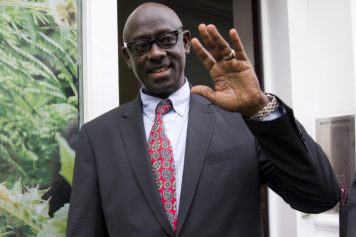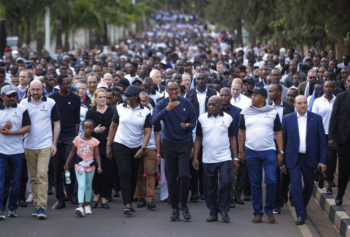Residents in the eastern region of the Democratic Republic of Congo are hoping that the upcoming peace talks between the Congolese government and the M23 rebels will mean their country can return to a sense of normalcy after the rebels have brought them to the brink of yet another war.
Two weeks ago when the M23 rebels rode into Goma, an important population and economic center, the Congolese army actually ran away and about 1,500 UN peacekeepers didn’t lift a finger to stop the rebels. The M23 have caused as many as 100,000 people to flee their homes, according to aid organizations such as Oxfam and UNICEF. Nearly half a million Congolese already live in camps because of the decades of violence.
Now the rebels will begin negotiations “in the next few days” with government officials in Kampala, Uganda, according to Interior Minister Richard Muyej Mangez.
M23’s political leader Jean-Marie Runiga said the rebels were “ready” for talks, where the rebels will make their demands.
But though there are talks of the airport in Goma being guarded with a combined force of M23 rebels and national army forces, Muyej Mangez said the DRC may not block those plans.
An accord between the rebels, Congo’s government and neighboring Rwanda and Uganda last month called for joint control of the airport using soldiers from the M23, the army and a “neutral force,” along with United Nations peacekeepers. The UN currently controls the airport.
“What’s important is that the airport is totally secured and there is not a dangerous coexistence that could create suspicions and bring us new conflict,” Muyej told reporters in Goma, capital of Congo’s North Kivu province.
In Goma, chaos and despair was widespread as the Congolese felt helpless in the face of the rapes and murders that seem to accompany the M23 wherever they go. There was a fear that if the M23 were intent on advancing across the country, it would soon blow up into a full-fledged war similar to the last Congolese war, which lasted over a decade and killed more than an estimated three million people. Those fears are still alive, even though the rebels have retreated.
When the Congo army soldiers rode into Goma, they were greeted by singing and cheering crowds and even women rushing forward to kiss them, according to an Associated Press report.
Observers are taking the return of the troops as a sign that Congo’s crisis just may be over.
“We felt like we were living in captivity during the 11 days of the rebel occupation,” Goma-based lawyer Emilie Mwanda told Africa Review.
“We were not allowed to walk freely; we could also not use our cars without risking to be pulled out by the rebel troops,” she said.
Mangez said the government would send a “full team” to the negotiations, including leaders of key institutions, civil society leaders and members of the national assembly and senate.
But Congolese President Joseph Kabila—who the rebels have demanded step down from power—is not expected to attend the negotiations in the beginning.
Rwanda has consistently denied any involvement in the M23 uprising—even though UN experts produced new evidence that they say “strongly upholds” previous accusations that Rwanda and Uganda had backed the M23.
“We have been, and are still involved in, the search for peace and stability in DRC,” Rwandan Foreign Minister Louise Mushikiwabo told reporters in Kigali.
“Political talks is the next step after M23 withdraw from Goma.”
The report, obtained by AFP on Monday, says that Rwanda and Uganda helped the M23 stage their offensive, with more than a thousand Rwandan troops joining the force that took Goma, while Uganda provided “logistics” support.
“Sources estimated that, in total, well over 1,000 RDF (Rwandan) troops came from Rwanda to assist M23”, the report read.
Both Kigali and Kampala have strongly denied involvement in the conflict.
Britain last week froze $33.7 million (25.9 million euros) in aid to Rwanda following what it said was “credible and compelling reports of Rwandan involvement with M23”.
“Aid is not charity nor everlasting,” Mushikiwabo added. “Rwanda and Africa are getting ready for the post-aid era and that era is coming.”


